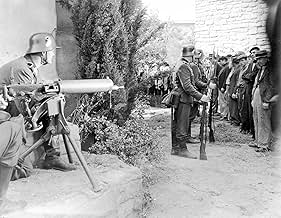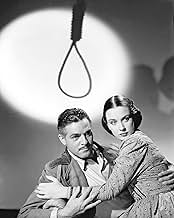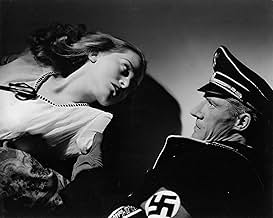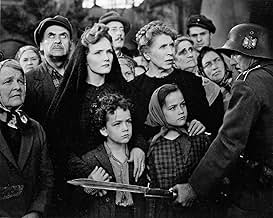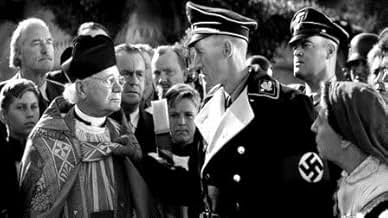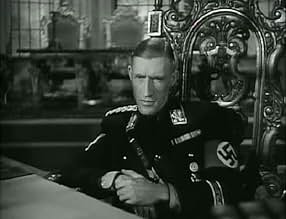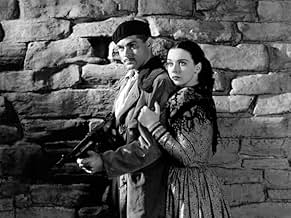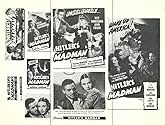Story of the assassination of Reinhard Heydrich, Nazi SS commander, by Czech partisans and the reprisals inflicted by the Nazis on the Czechs.Story of the assassination of Reinhard Heydrich, Nazi SS commander, by Czech partisans and the reprisals inflicted by the Nazis on the Czechs.Story of the assassination of Reinhard Heydrich, Nazi SS commander, by Czech partisans and the reprisals inflicted by the Nazis on the Czechs.
Ludwig Stössel
- Herman Bauer
- (as Ludwig Stossel)
Enrique Acosta
- Prisoner
- (uncredited)
Fred Aldrich
- German Machine Gunner
- (uncredited)
Nellie Anderson
- Old Lady Masaryk
- (uncredited)
Louis V. Arco
- German Sergeant
- (uncredited)
Richard Bailey
- Anton Bartonek
- (uncredited)
Wilmer Barnes
- Officer
- (uncredited)
Walter Bonn
- Military Doctor
- (uncredited)
Chet Brandenburg
- Linesman
- (uncredited)
Featured reviews
From his relatively safe base in England, Czech soldier Alan Curtis (as Karel Vavra) parachutes into his former hometown of Lidice, now controlled by bloodthirsty German Nazis. The village is a resource-rich riverside farming community, now helping to fatten Hitler's madmen. Hiding out and encouraging residents to support British allies through sabotage, Mr. Curtis reacquaints himself with glamorous schoolteacher Patricia Morison (as Jarmilla Hanka). While on his mission to bolster local resistance, Curtis is unable to resist Ms. Morrison's movie-star beauty. Their greatest obstacle is John Carradine (as Reinhardt Heydrich), an especially nasty Nazi called "The Hangman" and "The Protector" (of Hitler's Third Reich)...
This was director Douglas Sirk's first American film, after arriving from Hitler's Germany. He makes a great first impression on US shores and had, no doubt, some personal observations about Adolf Hitler and his fascist regime. The brutality is addressed more vividly in modern movies. Older films had to tone down the violence or omit it altogether in favor of gun-ho propaganda. Sirk manages to covey the horror without gore and tells the story exceptionally well...
"Hitler's Madman" is bogged down by the ill-placed Hollywood-style romance played by co-leads Curtis and Morrison. They are out of place, here, but the film's supporting roles are marvelous. The "Madman" in the title refers to Mr. Carradine. There are a couple others who would have made "Hitler's Madmen" a more appropriate heading. Carradine has several great scenes. So does gluttonous Ludwig Stossel (as Herman Bauer), the mayor inserted by the Nazis. And, while only seen briefly, Sirk has portly Howard Freeman (as Heinrich Himmler) primping memorably in a mirror while planning a slaughter...
From the obvious twists in Edgar Kennedy's showy alcohol-drenched hermit (Nepomuk) to the subtle revenge enacted by mournful German mayor's wife Johanna Hofer (as Magda), there are engaging characterizations. Yet, the story belongs to the "organizers and intellectuals" targeted by Hitler, and represented by veteran actor Ralph Morgan (as Jan Hanka). The father of leading lady Morrison, Mr. Morgan initially doesn't want to support the resistance because he believes his entire village could be destroyed. His character's journey is the one to follow and Morgan's "Jan Hanka" walks away with the film.
******** Hitler's Madman (6/10/1943) Douglas Sirk ~ Alan Curtis, Patricia Morison, Ralph Morgan, John Carradine
This was director Douglas Sirk's first American film, after arriving from Hitler's Germany. He makes a great first impression on US shores and had, no doubt, some personal observations about Adolf Hitler and his fascist regime. The brutality is addressed more vividly in modern movies. Older films had to tone down the violence or omit it altogether in favor of gun-ho propaganda. Sirk manages to covey the horror without gore and tells the story exceptionally well...
"Hitler's Madman" is bogged down by the ill-placed Hollywood-style romance played by co-leads Curtis and Morrison. They are out of place, here, but the film's supporting roles are marvelous. The "Madman" in the title refers to Mr. Carradine. There are a couple others who would have made "Hitler's Madmen" a more appropriate heading. Carradine has several great scenes. So does gluttonous Ludwig Stossel (as Herman Bauer), the mayor inserted by the Nazis. And, while only seen briefly, Sirk has portly Howard Freeman (as Heinrich Himmler) primping memorably in a mirror while planning a slaughter...
From the obvious twists in Edgar Kennedy's showy alcohol-drenched hermit (Nepomuk) to the subtle revenge enacted by mournful German mayor's wife Johanna Hofer (as Magda), there are engaging characterizations. Yet, the story belongs to the "organizers and intellectuals" targeted by Hitler, and represented by veteran actor Ralph Morgan (as Jan Hanka). The father of leading lady Morrison, Mr. Morgan initially doesn't want to support the resistance because he believes his entire village could be destroyed. His character's journey is the one to follow and Morgan's "Jan Hanka" walks away with the film.
******** Hitler's Madman (6/10/1943) Douglas Sirk ~ Alan Curtis, Patricia Morison, Ralph Morgan, John Carradine
This film is starts with a deceptive title. Reinhart Heydrich was many things, but mad as in clinically insane was not one of them. In fact among his peers he was known as the man with an 'iron heart'. Cold blooded efficiency in some of the nastiest butchery ever seen on this planet was his stock in trade.
And John Carradine played him that way. In many ways Heydrich was the archetype Aryan superman that Hitler lauded, but this guy scared Hitler and all the other top Nazis.
MGM made this film and even though it is a quickie B picture hurriedly put together to take advantage of current events of the war, Hitler's Madman has that tiffany type gloss that MGM product was noted for.
As was reported and at the time not reported fully, how could it have been since we had little access to the news from the Nazi point of view. But word got out about the bloody reprisals made against the Czech people whom Heydrich was governing even from behind the lines. Lidice was razed to the ground as it was the location of the assassination. If anything we could only guess how bad it was.
There are three other interesting portrayals to note. First is Howard Freeman as Heydrich's superior, Heinrich Himmler. William Shirer said that he looked about as frightening as a schoolmaster and that's how Freeman does him as well. His scene with the dying Heydrich is classic as he tells Heydrich he's going out a hero for the Fatherland and Heydrich just doesn't want to go.
Then there's Edgar Kennedy whom I never knew doing anything else but being the slow burn comedian. He plays a cynical hermit who shunned Czech society, but has no use for the Nazis either. But being and choosing to live alone makes him better able to adapt.
My favorite however was Ludwig Stossel who plays the German mayor of Lidice who is a proud Nazi, but who also hears about the loss of his two sons in Russia. Still when Heydrich is attacked, he's arrested for not doing enough to keep the people down and appreciative of their new masters. All of Stossel's protests about what a good party man he is and how loyal to the Fuehrer he is, avail him naught.
One big star is in this, but Ava Gardner is an extra somewhere in the crowd of Lidice citizens. I couldn't spot her, but you might have better luck.
Despite the deceptive title Hitler's Madman does hold up well for today's audiences. A film about Heydrich's whole career would be a fascinating one for today's audience.
And John Carradine played him that way. In many ways Heydrich was the archetype Aryan superman that Hitler lauded, but this guy scared Hitler and all the other top Nazis.
MGM made this film and even though it is a quickie B picture hurriedly put together to take advantage of current events of the war, Hitler's Madman has that tiffany type gloss that MGM product was noted for.
As was reported and at the time not reported fully, how could it have been since we had little access to the news from the Nazi point of view. But word got out about the bloody reprisals made against the Czech people whom Heydrich was governing even from behind the lines. Lidice was razed to the ground as it was the location of the assassination. If anything we could only guess how bad it was.
There are three other interesting portrayals to note. First is Howard Freeman as Heydrich's superior, Heinrich Himmler. William Shirer said that he looked about as frightening as a schoolmaster and that's how Freeman does him as well. His scene with the dying Heydrich is classic as he tells Heydrich he's going out a hero for the Fatherland and Heydrich just doesn't want to go.
Then there's Edgar Kennedy whom I never knew doing anything else but being the slow burn comedian. He plays a cynical hermit who shunned Czech society, but has no use for the Nazis either. But being and choosing to live alone makes him better able to adapt.
My favorite however was Ludwig Stossel who plays the German mayor of Lidice who is a proud Nazi, but who also hears about the loss of his two sons in Russia. Still when Heydrich is attacked, he's arrested for not doing enough to keep the people down and appreciative of their new masters. All of Stossel's protests about what a good party man he is and how loyal to the Fuehrer he is, avail him naught.
One big star is in this, but Ava Gardner is an extra somewhere in the crowd of Lidice citizens. I couldn't spot her, but you might have better luck.
Despite the deceptive title Hitler's Madman does hold up well for today's audiences. A film about Heydrich's whole career would be a fascinating one for today's audience.
This is one of those little typical WW II allied propaganda-flicks, made during WW II. It's rather simplistic and cheap looking all but its all enough to still make this movie a good watch, of course especially when you're a fan of the genre. Of course the biggest problem with this movie now days is its propaganda undertone that can be basically seen back in every sequence of the movie. Cowards become heroes and bad men turn into good ones. It makes the movie a bit ridicules and not always credible enough to watch now days but it's a part of the time period the movie got made in. The story itself is quite interesting on its won right but you feel it deserved a better and more fair and closer to the truth treatment. Who knows, maybe filmmakers will pick up this story once again and give it the treatment it really deserves and making it the great movie that this movie in potential could had also been. None of the actors really known to impress within this movie but John Carradine still manages to push the movie to greater heights with his role of Nazi SS commander. It's a movie worth watching due to its main story but it's production values and acting make this movie also far from a great or impressive one. 6/10
Douglas Sirk's career is recalled for his wonderful colorful attacks on the "American Dream" in those films he made (usually with Rock Hudson, Jane Wyman, and Agnes Moorehead) in the 1950s. Never was the lusciousness of American prosperity used to show the underside of our wealth oriented culture. But Sirk had a long career in Europe and Hollywood before he made "Magnificent Obsession" and "Imitation of Life". His films in the middle forties included some superb costume films with George Sanders (like "Summer Storm")and this early one which really stars John Carridine as one of the most monstrous figures of World War II, Reinhard Heydrich the so-called "Protector" of Bohemia, who chaired the Wannsee Conference of 1941 that created the "Final Solution". Whatever degree of venom Carridine brings to the role is nothing like the effortless evil the original Heydrich dripped. Still it is a very effective performance.
The film is based, by the way, on the poem "Lidice" by Edna St. Vincent Millay. Written shortly after that village was decimated in the reprisals following Heydrich's death, it is recited (in a woman's voice) in most of the film, but it's closing lines are recited by the male actors at it's conclusion - quite effectively as most of these actors (Edgar Kennedy, Jimmy Conlon, Ralph Morgan) have been slaughtered by the Nazis in front of us. As some of these actors (Kennedy and Conlon) usually were seen in comedies, their use as straight dramatic actors in this film is a revelation of what they might have done if they had not been used in comedy so much.
To me the best moment of this film (aside the use of the poem) is when Carridine lies dying in a hospital, visited by Howard Freeman as his comrade and fellow S.S. bigwig, Heinrich Himmler. Freeman was an affective actor in comic and dramatic parts, and here shows the hideous Himmler as a banal Babbitt bureaucrat. Perhaps not quite correct historically (Himmler was stranger than George Babbitt) but in it's way quite effective. Carridine had (in his characterization) shown something of the intellectual pretensions of Heydrich, but as he is dying he suddenly realizes he is frightened of dying. He tries to explain this to Himmler who doesn't care (so much for being a fellow Nazi comrade) and only sees the mission of the dying Heydrich to become a martyr to stiffen German will to victory. As Carridine finally dies, Freeman only sees his duty to make a large enough retaliation on the local population so that people will realize that he is harder than the dead martyr ever was.
Historically this is not accurate either. Heydrich had been in high level Nazi planning for several years, and frightened not only Himmler as a rival, but Bormann, Goebbels, and Hitler himself. Heydrich had a nasty "rumor" in his past: his father, a musician, may have been descended from Jews. This was never settled. However, due to this particular rumor, Heydrich's opponents felt they could control him. In actuality, it was easier to control an out of control Mercendes Benz. As soon as he could, Heydrich began collecting information on every one of his rivals about their family backgrounds (including Hitler's). It was his eventual determination that he would one day be the successor of "Der Fuhrer". Himmler, Hitler, and the others may have officially honored Heydrich as a national martyr, but in their own private moments they all were fully glad to see that he was dead and out of the way.
Their real reason for the massive retaliation was the fear of copycat plans. The Czechs who killed Heydrich were trained in London, and had Churchill's assent on their plot. No doubt, had they gotten away with it, plots against other Nazi big-wigs would have been set in motion. The retaliation was to remind the local populations that the Germans would not hesitate to depopulate them if anymore assassinations occurred. It was also a reminder to the Allies that if they wanted to save lives they better not plan any further killings. As such it worked. Although several plans for an attack on Hitler were finally set up, none were ever put into operation (the 1944 bomb plot was by the German General staff, not by Churchill). Whether this was wise or not is a matter we cannot ever tell the answer to.
Heydrich's actual death is nothing like the hideous death camps he set up for Jews, Gypsies, Slavs. etc. But it still is somewhat pleasant to think of the agony of his last days, his spine broken by the steel springs of his exploded car seat. The affection that his title "Protector" supposedly suggested is truly shown by a story of how a German soldier desperately tried to get passers by to assist to help move the "Protector" to a nearby hospital quickly. An unknown Czech citizen looked at the dying man in the ruins of his Mercedes, shrugged his shoulders, and said, "The hospital is around the corner. He could walk there." Then he left the flustered soldier.
The film is based, by the way, on the poem "Lidice" by Edna St. Vincent Millay. Written shortly after that village was decimated in the reprisals following Heydrich's death, it is recited (in a woman's voice) in most of the film, but it's closing lines are recited by the male actors at it's conclusion - quite effectively as most of these actors (Edgar Kennedy, Jimmy Conlon, Ralph Morgan) have been slaughtered by the Nazis in front of us. As some of these actors (Kennedy and Conlon) usually were seen in comedies, their use as straight dramatic actors in this film is a revelation of what they might have done if they had not been used in comedy so much.
To me the best moment of this film (aside the use of the poem) is when Carridine lies dying in a hospital, visited by Howard Freeman as his comrade and fellow S.S. bigwig, Heinrich Himmler. Freeman was an affective actor in comic and dramatic parts, and here shows the hideous Himmler as a banal Babbitt bureaucrat. Perhaps not quite correct historically (Himmler was stranger than George Babbitt) but in it's way quite effective. Carridine had (in his characterization) shown something of the intellectual pretensions of Heydrich, but as he is dying he suddenly realizes he is frightened of dying. He tries to explain this to Himmler who doesn't care (so much for being a fellow Nazi comrade) and only sees the mission of the dying Heydrich to become a martyr to stiffen German will to victory. As Carridine finally dies, Freeman only sees his duty to make a large enough retaliation on the local population so that people will realize that he is harder than the dead martyr ever was.
Historically this is not accurate either. Heydrich had been in high level Nazi planning for several years, and frightened not only Himmler as a rival, but Bormann, Goebbels, and Hitler himself. Heydrich had a nasty "rumor" in his past: his father, a musician, may have been descended from Jews. This was never settled. However, due to this particular rumor, Heydrich's opponents felt they could control him. In actuality, it was easier to control an out of control Mercendes Benz. As soon as he could, Heydrich began collecting information on every one of his rivals about their family backgrounds (including Hitler's). It was his eventual determination that he would one day be the successor of "Der Fuhrer". Himmler, Hitler, and the others may have officially honored Heydrich as a national martyr, but in their own private moments they all were fully glad to see that he was dead and out of the way.
Their real reason for the massive retaliation was the fear of copycat plans. The Czechs who killed Heydrich were trained in London, and had Churchill's assent on their plot. No doubt, had they gotten away with it, plots against other Nazi big-wigs would have been set in motion. The retaliation was to remind the local populations that the Germans would not hesitate to depopulate them if anymore assassinations occurred. It was also a reminder to the Allies that if they wanted to save lives they better not plan any further killings. As such it worked. Although several plans for an attack on Hitler were finally set up, none were ever put into operation (the 1944 bomb plot was by the German General staff, not by Churchill). Whether this was wise or not is a matter we cannot ever tell the answer to.
Heydrich's actual death is nothing like the hideous death camps he set up for Jews, Gypsies, Slavs. etc. But it still is somewhat pleasant to think of the agony of his last days, his spine broken by the steel springs of his exploded car seat. The affection that his title "Protector" supposedly suggested is truly shown by a story of how a German soldier desperately tried to get passers by to assist to help move the "Protector" to a nearby hospital quickly. An unknown Czech citizen looked at the dying man in the ruins of his Mercedes, shrugged his shoulders, and said, "The hospital is around the corner. He could walk there." Then he left the flustered soldier.
This film story of the assassination of Reinhard Heydrich (titled by the Nazis as Reichs Protector of Bohemia and Moravia, by the Czechs as "The Hangman", and also one of the architects of "The Final Solution")and of the subsequent annihilation of the village of Lidice by the Nazis, really does not do justice to the subject. Although released by MGM, it was actually produced by poverty row Producer Releasing Corporation (PRC). Some of the cast members are old familiars and rather good, but none give a feeling that these are Czechs being murdered by Hitler's minions. As war propaganda, it is a success, and it at least gives the spirit of the tragedy of Lidice, if not historically detailed facts. John Carradine is effective as Heydrich, especially in his deathbed scene.
The facts about the assassination briefly are that two Czech partisans were parachuted into Czechoslovakia from an RAF plane. They managed to ambush Heydrich's open Mercedes, throw a bomb under it, and escape to a church. Heydrich died a few days later from complications arising from the penetration of his spleen by bomb fragments and debris from the car upholstery. Using torture, the Nazis discovered the whereabouts of the two partisans and the SS killed them at once. Lidice was picked more or less at random from among villages known to have anti-German leanings. On Hitler's orders, the men were shot and the women and children removed to camps, while the buildings of the site were levelled. When it became known in the allied world, this made excellent anti-Nazi propaganda, and more than one film was made of the subject. It may be that the massive retaliation backfired somewhat on the Nazis also by stiffening Czech resistance to the occupation.
The facts about the assassination briefly are that two Czech partisans were parachuted into Czechoslovakia from an RAF plane. They managed to ambush Heydrich's open Mercedes, throw a bomb under it, and escape to a church. Heydrich died a few days later from complications arising from the penetration of his spleen by bomb fragments and debris from the car upholstery. Using torture, the Nazis discovered the whereabouts of the two partisans and the SS killed them at once. Lidice was picked more or less at random from among villages known to have anti-German leanings. On Hitler's orders, the men were shot and the women and children removed to camps, while the buildings of the site were levelled. When it became known in the allied world, this made excellent anti-Nazi propaganda, and more than one film was made of the subject. It may be that the massive retaliation backfired somewhat on the Nazis also by stiffening Czech resistance to the occupation.
Did you know
- TriviaWhile in Germany before the war, director Douglas Sirk met Reinhard Heydrich at a party, and later recalled that "he made my blood run cold."
- GoofsHeydrich was ambushed in the city of Prague, not on a country road. His travel plans were also no secret: despite Hitler's admonitions Heydrich always took the same route when traveling in the city, believing the the people were too cowed to dare attack him.
- Quotes
[last lines]
Anton Bartonek: Telling you not to eat or drink. one morsel of food, one swallow of drink, before you think, Before you think! What is best for your country. Keep your country free from the foe you hate. Catch him! Catch him! Do not wait!
- ConnectionsFeatured in Hollywood et la Shoah (2004)
- How long is Hitler's Madman?Powered by Alexa
Details
- Release date
- Country of origin
- Languages
- Also known as
- Hitler's Hangman
- Filming locations
- Angeles Crest Highway, Angeles National Forest, California, USA(exterior snow scenes)
- Production companies
- See more company credits at IMDbPro
Box office
- Budget
- $300,000 (estimated)
- Runtime1 hour 24 minutes
- Color
- Aspect ratio
- 1.37 : 1
Contribute to this page
Suggest an edit or add missing content


